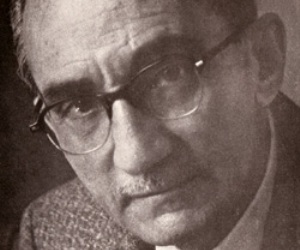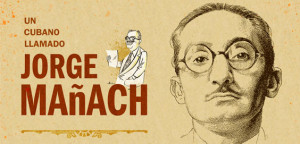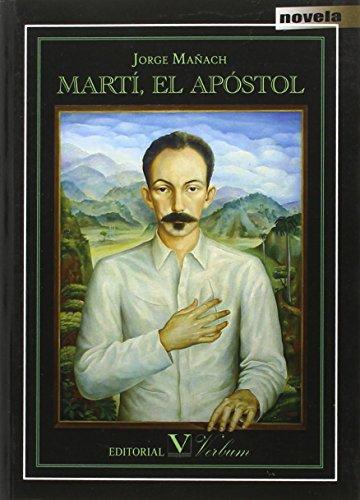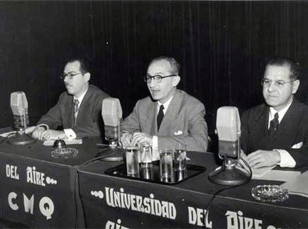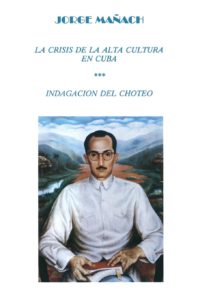Born on February 14, 1898, in Sagua La Grande, former province of Las Villas, Mañach left with his parents to Spain, in 1907, and settled in the town of Tembleque, where he did elementary studies and was a student of painting.
When it is one hundred and twenty years since his birth, Jorge Mañach Robato, one of the most brilliant intellectuals in Cuba, continues to be unknown to our new generations. The cause of this mess ?: The intolerance of the regime.
He returned to Havana in 1913, and when his father died, in 1915, he traveled to the United States, where he attended secondary school, at the Cambridge High Latin School in Massachusetts. Thanks to his application, he obtained a scholarship to continue studies at Harvard University, where he graduated as a bachelor of arts. In 1921, he obtained the Sheldon scholarship, which allowed him to study two years of law at the Sorbonne, in Paris. Then, he returns to Havana, where he graduates, in 1924, a doctorate in Civil Law, and in 1928, the corresponding Philosophy and Letters.
He was one of the founders of the ABC party, which confronts the dictator Gerardo Machado, and at the same time director of the newspaper Acción, organ of that party, between 1934 and 1935. In 1934, he was Minister of Public Instruction of the Caffery-Batista-Mendieta government, and between 1935 and 1939, he had to live in exile, due to his revolutionary ideas, during which he worked at the School of Hispanic Language and Literature at Columbia University, in New York, becoming Director of Hispanic American Studies in the Institute of the Spains, of said university.
Back in Cuba, he was delegated to the Constituent Assembly, which bequeathed us the 1940 Constitution, and a prominent professor at the University of Havana. He was also Minister of State during the last months of the constitutional government of Fulgencio Batista, besides leader of the Party of the Cuban Town (Orthodox), and Director of the University of the Air, between 1948 and 1952. He was in disagreement with the executed coup d’etat by Batista, in 1952, and in 1957 he returned to exile, from which he returned in 1959, when the revolution triumphed, which he supported publicly until he discovered his Marxist projection, a fact that, linked to the harassment he was being subjected to, determined that He will return to exile, where he died, in June 1961.
Mañach is the author of more than two thousand titles and active participant in the political life of the country, he was a fervent fighter against corruption and in favor of the role of culture within society, an unavoidable intellectual.
His works, published in Spain, Latin America and the United States, are almost not published in Cuba, thanks to the samba of a reactionary that was endorsed by influential intellectuals closely linked to the sectarian politics that, starting in 1959, began to implement the communist faction of the Socialist Party. Popular, within the government established by Fidel Castro. The consequences of this policy for the culture of the country, its responsibility in the early splits of the revolution and in the subversion of its initial program, is something that has not been studied with depth and courage. Suffice it to say that two of Mañach’s most popular works, a biography of our National Hero entitled Martí, the Apostle, and the essay Inquiry into Choteo, have only been published once in Cuba, for a whopping 54 years.
Other works of his no less important, such as Estampas de San Cristobal and Utilitarismo y Cultura, more like his polemic with Ruben Martinez Villena, the Origenists and with Porfirio Pends, are still of the knowledge of academics and the privileged who have been able to acquire the very few texts de Mañach published by the regime. Although he also wrote stories, novels, theater plays and articles, Mañach is fundamentally recognized for his essays, cataloged by several scholars as one of the most important in twentieth-century Latin American literature. Not in vain, the truth has been gradually established within the intellectual and cultural circles of the country.
Jorge Manach died on June 25, 1961, San Juan, Puerto Rico and despite the fact that those who deny it, Jorge Mañach strongly resurfaces, in his own right, as a fundamental and indispensable cone of the national culture.
JORGE MAÑACH, UNO DE LOS INTELECTUALES MÁS BRILLANTES QUE HA DADO CUBA.
Nacido el 14 de febrero de 1898, en Sagua La Grande, antigua provincia de Las Villas, Mañach partió con sus padres hacia España, en 1907, y se estableció en el pueblo de Tembleque, donde hizo estudios elementales y fue alumno de pintura.
Cuando se cumplen ciento veinte años de su nacimiento, Jorge Mañach Robato, uno de los intelectuales mas brillantes de Cuba, continua siendo un desconocido para nuestras nuevas generaciones. La causa de este desaguisado?: La intolerancia del régimen.
Regresa a La Habana en 1913, y al fallecer su padre, en 1915, viaja a los Estados Unidos, donde cursa estudios secundarios, en el Cambridge High Latin School, de Massachusetts. Gracias a su aplicación, obtuvo una beca para continuar estudios en la Universidad de Harvard, donde se graduó como bachiller en artes. En 1921, obtuvo la beca Sheldon, que le permitió estudiar dos años de Derecho en La Sorbona, en Paris. Luego, regresa a La Habana, en cuya Universidad concluye, en 1924, el doctorado en Derecho Civil, y en, 1928, el correspondiente a Filosofa y Letras.
Fue uno de los fundadores del partido ABC, que enfrenta al dictador Gerardo Machado, y a la vez director del periódico Acción, órgano de dicho partido, entre 1934 y 1935. En 1934, fue ministro de Instrucción Pública del gobierno Caffery-Batista-Mendieta, y entre 1935 y 1939, tuvo que vivir en el exilio, debido a sus ideas revolucionarias, lapso en el que trabajó en la Facultad de Lengua y Literaturas Hispánicas de la Universidad de Columbia, en Nueva York, llegando a ser nombrado Director de Estudios Hispanoamericanos en el Instituto de las Españas, de dicha universidad.
De regreso a Cuba, fue delegado a la Asamblea Constituyente, la que nos legó la Constitución de 1940, y un destacado profesor de la Universidad de La Habana. También fue Ministro de Estado durante los últimos meses del gobierno constitucional de Fulgencio Batista, además de dirigente del Partido del Pueblo Cubano (Ortodoxo), y Director de la Universidad del Aire, entre 1948 y 1952. Estuvo en desacuerdo con el golpe de estado ejecutado por Batista, en 1952, y en 1957 volvió al exilio, del cual regresa en 1959, cuando triunfa la revolución, a la cual apoyó públicamente hasta que descubrió su proyección marxista, hecho que, vinculado al acoso de que estaba siendo objeto, determinó que regresara al exilio, donde falleció, en junio de 1961.
Mañach es autor de mas de dos mil titulos y activo participante en la vida política del país, fue un ferviente luchador en contra de la corrupción y a favor del papel de la cultura dentro de la sociedad, un intelectual insoslayable.
Sus obras, publicadas en España, Latinoamerica y Estados Unidos, casi no se publican en Cuba, gracias al sambenito de reaccionario que le endilgaron influyentes intelectuales muy vinculados a la politica sectaria que a partir de 1959 comenzo a instrumentar la aupada faccion comunista del Partido Socialista Popular, dentro del gobierno establecido por Fidel Castro. Las consecuencias de esta política para la cultura del país, su responsabilidad en las tempranas escisiones de la revolución y en la subversion de su programa inicial, es algo que no se ha estudiado con profundidad y valentía. Baste decir que dos de las obras ms populares de Mañach, una biografía de nuestro Héroe Nacional titulada Martí, el Apóstol, y el ensayo Indagación del choteo, solamente han sido publicadas una vez en Cuba, durante la friolera de 54 años.
Otras obras suyas no menos importantes, como Estampas de San Cristobal y Utilitarismo y Cultura, mas como sus polemicas con Ruben Martinez Villena, los origenistas y con Porfirio Pends, siguen siendo del conocimiento de academicos y de los privilegiados que han podido adquirir los escasisimos textos de Mañach publicados por el regimen. Aunque también escribió cuentos, novelas, obras de teatro y artículos, Mañach es fundamentalmente reconocido por su ensayística, catalogada por varios estudiosos como una de las mas importantes dentro de la literatura hispanoamericana del siglo XX. No en balde, la verdad se ha ido estableciendo paulatinamente dentro de los círculos intelectuales y culturales del país.
Jorge Manach muere el June 25, 1961, San Juan, Puerto Rico. A pesar que quienes lo niegan Jorge Mañach resurge con firmeza, por derecho propio, como un cono raigal e imprescindible de la cultura nacional.
Agencies/Wiki/Roberto Quiñones/cubanet/Excerpts/Internet Photos/ Arnoldo Varona/TheCubanHistory.com
THE CUBAN HISTORY, HOLLYWOOD.



 > JORGE MAÑACH, one of the Most Brilliant Intellectuals that Cuba has Given. <> JORGE MAÑACH, uno de los más brillantes intelectuales que ha dado Cuba.
> JORGE MAÑACH, one of the Most Brilliant Intellectuals that Cuba has Given. <> JORGE MAÑACH, uno de los más brillantes intelectuales que ha dado Cuba.